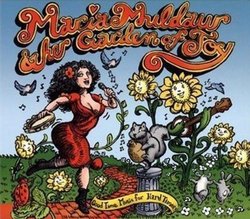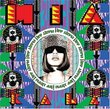| All Artists: Maria Muldaur Title: Garden of Joy Members Wishing: 3 Total Copies: 0 Label: Stony Plain Music Original Release Date: 1/1/2009 Re-Release Date: 10/6/2009 Genre: Pop Style: Number of Discs: 1 SwapaCD Credits: 1 UPC: 772532133227 |
Search - Maria Muldaur :: Garden of Joy
 | Maria Muldaur Garden of Joy Genre: Pop
"America's First Lady of Roots Music," Maria Muldaur, returns to her original roots - Jug Band Music! Maria first recorded in the early 60's with both The Even Dozen and The Jim Kweskin Jug Bands. Here she has reunited wit... more » |
Larger Image |
CD DetailsSynopsis
Product Description "America's First Lady of Roots Music," Maria Muldaur, returns to her original roots - Jug Band Music! Maria first recorded in the early 60's with both The Even Dozen and The Jim Kweskin Jug Bands. Here she has reunited with several of her former jug band mates and recorded many tunes from the classic jug band era (early 30's), as well as two hilarious newly penned gems by Dan Hicks.Special guests include John Sebastian, David Grisman, Taj Mahal, Dan Hicks, Fritz Richmond and sensational discovery Kit Stovepipe. This is happy, lighthearted, "Good Time Music for Hard Times" indeed! Similarly Requested CDs
|
CD Reviews*In The Beginning There Was......Jug- Songstress Maria Mulda Alfred Johnson | boston, ma | 11/14/2009 (5 out of 5 stars) "The last time that I featured the femme fatale blues torch singer reincarnate Maria Muldaur (at least that is the way that she, successfully, projected herself in her recent blues revival projects) was in a review of her 2007 CD tribute to the great singers of the 1920s and 1930s, Bessie Smith, Memphis Minnie, Sippy Wallace and the like. I might add that I raved on and on about the value of her project, the worthiness of the singers honored and her own place in the blues pantheon. Of course, for those in the know about the roots of the folk revival of the 1960s at least, the name Maria Muldaur is forever associated with another closely-related branch of roots music-the jug band. Maria was the very fetching female vocalist for the old time revivalist Jim Kweskin Jug Band (and an earlier effort in her home town, New York City, by John Sebastian of The Lovin' Spoonful fame, The Even Dozen Jug Band). Well, hold the presses please, because the red hot blues mama has come back home in her latest project, the CD under review, "Maria Muldaur And Her Garden Of Joy". And if Maria was kind of thrown in the background somewhat in those days by the strong presence of Jim Kweskin and that of her ex-husband Geoff Muldaur she is front and center on this effort. One of the virtues of jug music back in the day was that it was basically zany, funny, send-off kind of music and full of, usually, high-spirited if coded sexual innuendos. This, on occasion, was a welcome break from the heavy political message songs that were de rigueur or the traditional ballads filled with tales of thwarted love, duplicity and murder and mayhem. In this CD Maria brings back the energy and just plain wistfulness of that type of music. And she does it on her terms. As fate would have it, or rather by a conscious act, I happened to see Maria and her very fine new jug band made up of younger, well, Jim Kweskin jug band-types (along with guest performer, now blues/ragtime guitar virtuoso John Sebastian) in Cambridge (one of her old stomping rounds and an important secondary center of the folk revival in the 1960s). And, like the last time I saw her a couple of years ago when she was that femme fatale blues singer, she did not disappoint. The woman carried the show with the energy of the old days (that you can get an idea of by going on "YouTube" in a click from 1966). The line between jug music and flat out torch blues sometimes is not that wide and the switch over thus is not that dramatic. At least in Maria's hands. Witness her version of Mississippi John Hurt's "Richland Woman" which she did jug-style at the concert (she did a more lowdown bluesy version on her "Richland Woman" album). The example on this album that comes to mind is the little known but, currently, very relevant 1929 song "Bank Failure Blues". Also the classic jug tune "Garden Of Joy" and another one "Sweet Lovin' Ol' Soul" (also done blues-style on a previous album of the same name). This is good stuff but begs the question. Jim Kweskin is still performing. Geoff Muldaur is still performing. Geoff and Jim occasionally perform together. Wouldn't it be a treat if...? " The Hippie Shakes! David A. James | Fairbanks, AK USA | 11/22/2009 (4 out of 5 stars) "Several albums back I decided that Maria Muldaur had finally redeemed herself for foisting "Midnight at the Oasis" on us back in the seventies (it's OK, Maria, that was a difficult decade for most of us). However, if you still cringe when you think of that song and therefore haven't given MM a listen since, you've been missing some great music. Each new album she records explores a different strand of old style music, ranging from bawdy blues to Louisiana songs to a great Peggy Lee tribute disc. She has amazing versatility, and this album continues her winning streak. You pretty much can't go wrong with jug band music, and Ms. M knows how to play it right. This is the sound of a bunch of old hippies having a gas playing the music they grew up loving. It's nothing but foot-stompin' fun." Let Me Be Your Teddy Lee Armstrong | Winterville, NC United States | 12/14/2009 (5 out of 5 stars) "Maria's new set is a complete delight. She bobs and scoobydoos all over the place with John Sebastian on guitar, David Grisman on mandolin & Taj Mahal on banjo & guitar. The opener "The Diplomat" penned by Dan Hicks has a great bell percussion and Maria's tongue-in-cheek vocals, "A man stepped on my toe and I say, 'Oh pardon me!'" "There's a creepy melody like a fiend keeps haunting me, all night long it rambles on through my brain, and I'm near insane," Maria sings on the Dixieland-flavored "The Ghost of St. Louis Blues." "Sweet Lovin' Ol' Soul" has a Taj Mahal flavor with its lazy swampy shuffle, "Let me be your teddy till your big bear comes; but don't you tell your big bear what your little old teddy has done." "He Calls That Religion" (but I know he's going to hell when he dies) has stinging irony for errant clergy and will put a smile on your face. "Good Time Music for Hard Times" is aptly titled and will put a smile on your face despite your troubles. Enjoy!"
|

 Track Listings (12) - Disc #1
Track Listings (12) - Disc #1

